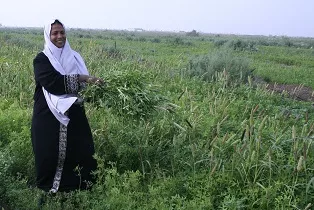Helping small-scale farmers in West Asia, North Africa produce and earn more
16 October 2015
Farmers in marginal environments face more threats to agricultural production than their peers elsewhere do. Lack of water, extreme weather events like drought, falling soil fertility, and decreasing precipitation pose regular risks to crop yields. However, adding to the problem in the West Asia and North Africa (WANA) region are also growing salinity and water logging as more than 25% of agriculture is irrigation-based.
More resilient and alternative crops, as well as better land and water management practices, can all help to improve the lot of resource-poor farmers in the region.
This thinking has driven a collaborative initiative by researchers from the International Center for Biosaline Agriculture (ICBA) and the International Fund for Agricultural Development (IFAD).
Funded by the IFAD, the OPEC Fund for International Development and the Islamic Development Bank, the initiative aimed to introduce resilient forage crops, and diversified crop production and land management systems in Jordan, Egypt, Oman, Tunisia, Palestine, and Yemen.
“The close collaboration with local farmers and extension services was the driving force behind the progress we have achieved. The adoption of these new crop species and agricultural systems by relevant administrations in these countries helped us move from experimental centers to wide participation of farmers,” said Dr. Abdullah Al-Dakheel, project coordinator and head of crop diversification and genetic improvement section at ICBA.
Working together with national partners, researchers developed integrated management packages for crop production at the farm level.
Researchers found that yield gaps were very big in many cropping systems in partner countries due to gaps in the management of drainage and farm, planting methods, and fertilization programs. Around 45 experiments were set up to increase cereal forage yields by 70% and grain yields by 30%, with recommendations and policy options being submitted to key decision-makers.
“I was approached by a group of scientists. They asked me to test a sample of water and soil and then they gave me 20 kg of wheat grains that I planted in an area of 2,000 sq. m. And the harvest was successful,” said Khaldoon Salem, a farmer in the Zarqa area of Jordan.
Based on the evaluations, farmers’ preferences and field performance, each country identified a list of winter and summer annual and perennial salt-tolerant forages and field crops that can help to secure forage resources throughout the year for multiplication and distribution to farmers.
As part of this collaboration, members of the research team, representatives from partner organizations and national partners - around 250 people - met in Cairo in September 2015 to discuss the project development and research outcomes.
As October 16 marks World Food Day, it is worth remembering that small-scale farmers might hold the key to ending hunger and poverty in rural areas. All they need is just better tools to deal with challenges they face every day and a little more support from policymakers.











